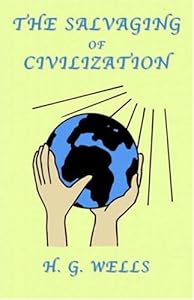 Cover via AmazonIntroduction
Cover via AmazonIntroduction As a fan of science fiction, the name H. G. Wells is awe striking. While Jules Verne definitely predated H. G. Wells with his marvellous A Journey to the Centre of the Earth (1864) vs. The Time Machine (1895), he is nonetheless seen as the co-father of the genre.The Salvaging of Civilization (1921) is the first nonfiction work that I have read. It is available for free at Gutenberg.org.
It is a coincidence that much of what was written in this book echoes many of the ideas from More's Utopia, which I very recently reviewed. Also, I was teaching an essay class today which featured the topic and concept of 'groupthink.' Basically, the theory behind groupthink is that a strong leader or individual leads either a group of yes-men, or individuals who all share the same or a similar point-of-view. So these three things are going through my mind as I prepare for my review.
Politics
A brief, and perhaps unnecessary note, is that his essay was published not too long after the cessation of WWI. The terror and destructive power of which Europe, and perhaps the world, had never seen from man's wars up to that point. It wouldn't be long before his prophecy of there being much worse weapons brought about by technology coming to bear on civilization. He believed in a world government which would rule other lesser governments when these lesser governments came into conflict. "The true history of mankind and of the possibilities of this vision of a single world state that history opens out to us." And yet this contrasts stiffly with his declaration that men ought to judge whether a government is right enough to warrant following: "This is the plain duty of every honest man to-day, to judge his magistrate before he obeys him, and to render unto Caesar nothing that he owes to God and mankind." Are we to be individuals with individual states, or are we not?
Religion
A contention that More and Wells most certainly would have had would have been over the place of religion within a civilized society. Where Wells declares, "The most popular religions are those which hold out the widest hopes of damnation," More contended that permissive and tolerant religion would rule the perfect society, and that the atheist is the bane of a peaceful and law-abiding culture.
Wells talks deeply about the idea of a new type of Bible. He points out that in the distant past, the Bible as we know it today was a living document: the authors thereof would cut and paste segments of the book. I suspect that it wasn't until John's Revelations that the act of doing so was considered problematic.
Wells points out that many parts of the Bible were basically designed to educate its readers/listeners with history, offer suggestions of survival, but he does not dwell on the moral aspects therein.
Several sections he suggests would be cut would be found in Job (a great literary work, but unnecessary) and Leviticus. Of Leviticus he writes, "So far as redundancy goes, a great deal of the Book of Leviticus, for example, seems not vitally necessary for the ordinary citizen of to-day." Certainly the context of the Bible is not necessarily applicable to the vast populations of Christendom today. Survival in a desert is not necessarily the same as survival in a concrete and glass jungle today.
He would add historical events that have occurred since the last addendum to the Bible. Also, wisdom, and in particular, Abraham Lincoln's Gettysburg Address; I think he would have also included Martin Luther King Jr.'s I Have a Dream had he heard it.
A primary and secondary list of books he believed ought to exist in an apocryphal collection of compulsory literature to be read followed by a collection of non-compulsory literature which would also be highly regarded.
Education
He also calls for extensive educational reform. He decries the inadequacy of education in his day, and promotes the idea of using technology to improve the delivery of the variety of school subjects: "Instead of the teacher having to pretend, as he usually pretends now, to a complete knowledge of the foreign language he can really only smatter, he would become the honest assistant of the real teaching instrument—the gramophone." Later he refers to a 'cinematograph' which I believe is either a television or a projector. The lack of talent in the live teacher would be made up for by the skill and genius of the teacher in some central hub who would produce and have manufactured the records to play the content.
Finally, he also mentions that education should be a life-long exercise. This is an echo of More's position which suggests that in Utopia, Everyman continues his studies past the completion of regular studies.
Conclusion
I do not support everything he has stated. A lot of it, in particular his suggestions for educational reform, have come about. I am referencing his suggested use of technology in the classroom. I cannot understate the usefulness of the Internet with such tools as YouTube, the image collection from Google, Google Earth, Google's translator, etc., to the effectiveness of my lessons. However, I feel that there is a great deal of room left for improvement.
While I appreciate there is a need for the elimination of war, I don't believe in homogenizing the world. While I believe in education becoming a universal right, I also find myself against the idea of universal education. Also, watching experiments on a TV cannot substitute for hands-on experimenting.

No comments:
Post a Comment